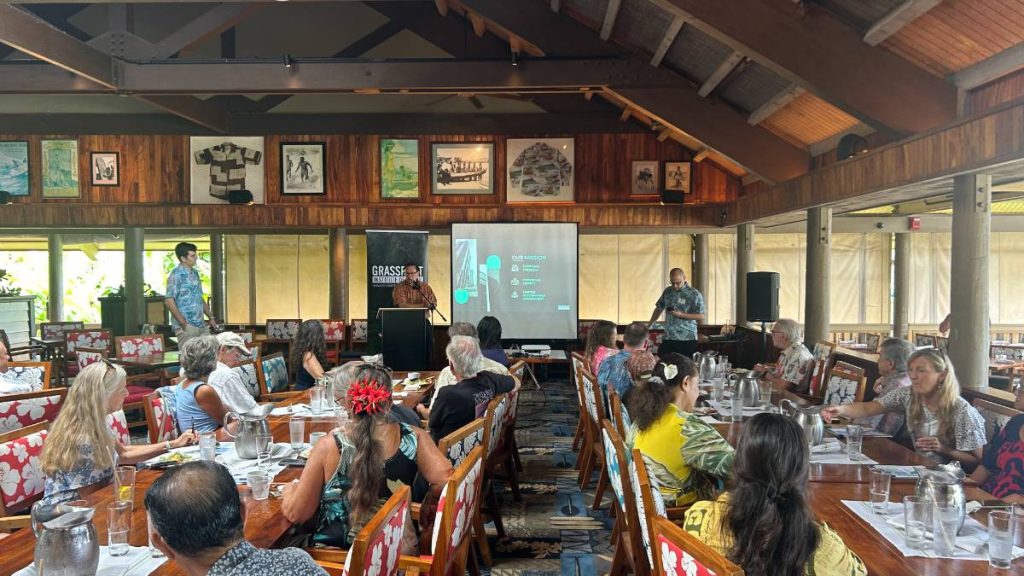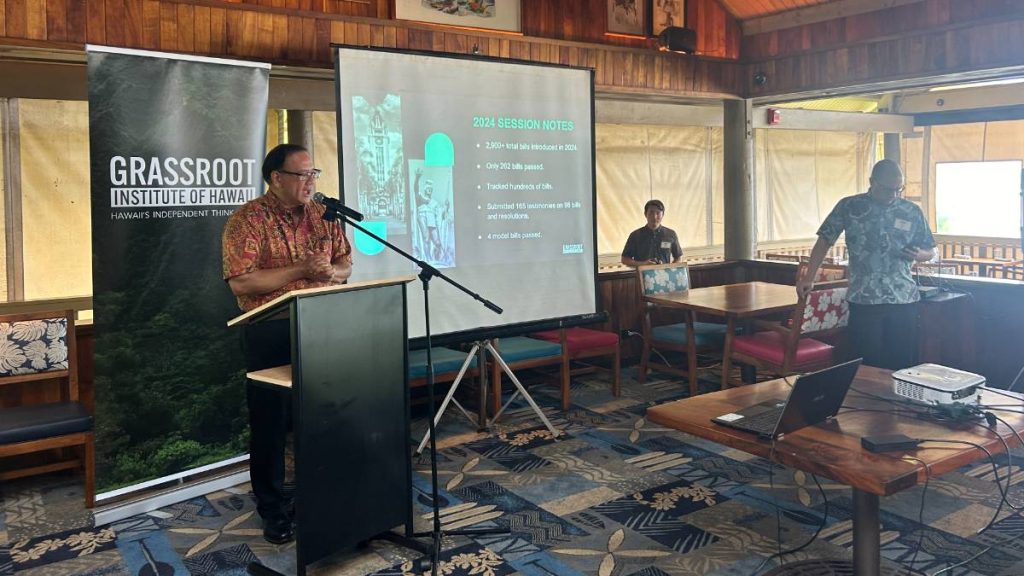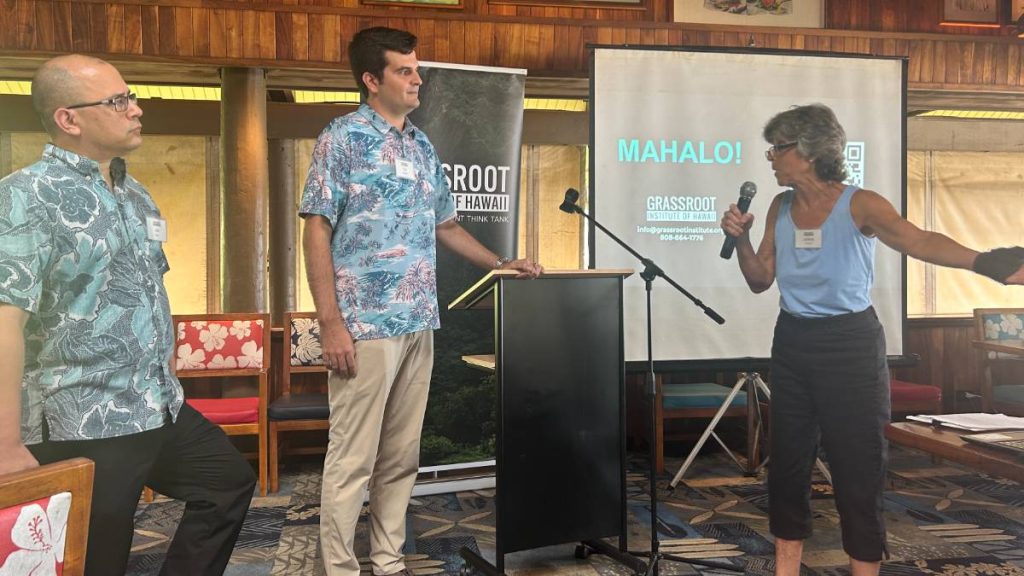The Grassroot Institute reflects on 2024 legislative session on Kauaʻi
Members of the Grassroot Institute of Hawaiʻi traveled from Oʻahu to Kauaʻi earlier this month to meet with residents and discuss some of the measures they supported that passed through the Hawaiʻi Legislature.
“I always love getting a chance to go out to Kauaʻi and talk with people,” said Ted Kefalas, the organization’s director of strategic campaigns, in an interview following the event. He noted that it was the first time the organization has held an event on the Garden Isle.
“Unfortunately, a lot of the attention oftentimes will go to Oʻahu, Honolulu, or even Maui in certain cases. So it’s always great to get out there and get to talk with people face to face,” he said.
The Grassroot Institute is a nonprofit organization that aims to protect individual liberties, advance economic freedom, and promote limited, accountable government in Hawai’i, according to Keliʻi Akina, its president and CEO.
Akina made the remarks while describing the organization during an introductory speech at the Grassroot Institute’s public event at Duke’s Restaurant in Lihuʻe on June 6, when members discussed measures they supported to reduce taxes, increase housing, and improve healthcare across the state during the 2024 legislative session.
2900 bills came up this year, including a lot of “do nothing bills” that use up time and energy, said Kefalas, who was another speaker at the event.
262 bills passed the legislative session, and the Grassroot Institute was tracking hundreds of them, he noted.
“Anything from tax hikes to tax cuts to housing deregulation, to health care access. You name it, we were probably involved in it in some capacity,” said Kefalas, adding they testified on close to 100 bills.
The organization highlighted assisting with several measures, including the Green Affordability Plan, and housing bills, including House Bill 2090, which makes it easier for developers to convert commercial office spaces for residential uses.
Councilwoman Felicia Cowden, who attended the event, was in support of the measure. “I totally supported that (HB 2090),” she said in a recent interview, noting that there are many buildings with empty space on Kaua’i. “It would be good if we could turn it into housing.”
During the event, the Grassroot Institute also highlighted Senate Bill 3202, which was led by former Kaua’i Council Member and current State Rep. Luke Evslin (D-District 16). The measure aims to increase housing inventory by allowing homeowners to build up to two additional dwelling units on residentially zoned lots.
The policy was already in effect on Kauaʻi, but the bill allows it to also be implemented across the state. Kefalas called Kauaʻi “ahead of the curve” when it comes to addressing housing issues, pointing out that Evslin was a driver of both HB 2090 and SB 3202. “We’ve really seen a lot of folks from Kauaʻi kind of band together and really take the lead when it comes to the housing issue,” he said.
The meeting also highlighted a $5 billion tax cut through the Green Affordability Plan, according to Joe Kent, the executive vice president of the Grassroot Institute. “You might see $1,000 in savings this year. It might be $2,000 in savings next year, such that by the time we hit 2031, you might see $10,000 to $15,000 $30,000 in tax savings, depending on your income,” he said.
“The whole state legislature passed this at our urging, so this is a great example of what we like to call working together, or e hana kākou,” said Kent.
The event also addressed the need for improved medical care through House Bill 2415, which allows Hawaiʻi to become part of the multi-state Nurse Licensure Compact and makes it easier for nurses from outside states to practice in Hawaiʻi.
“This is something that we think will make it a lot easier for folks that want to move here and are already practicing nurses in other states … to move to Hawaiʻi and not have to jump through all the hoops that were typical in the past,” said Kefalas.
Kefalas noted that the measure would make it easier for practicing nurses who were forced to leave due to affordability issues to return to the state and find a job, instead of needing to wait for a permit.
Kefalas also hopes the housing bills will help address issues with affordability and prevent residents from moving out of the state.
“Our families and friends continue to go to places like Las Vegas and the number one driver of the cost of living is the cost of housing,” he said, adding that several studies have shown local residents canʻt afford to live in the state due to high mortgages and rents.
“Our focus is really trying to open up new opportunities and new options for those people that want to stay, or want to move back here to Hawaiʻi,” he said in the follow-up interview.
Following the event, Cowden said she appreciated the amount of attention to detail that the institute puts into county tax and fiscal policy.
“They give us a lot of good information, and I was really happy to be there to support them because of all the quality work they do in analysis of our housing and our economic policy,” Cowden said.
The Grassroot Institute’s work includes lobbying, drafting legislation, and creating various reports, including a website called Homes for our Ohana, which breaks down how SB 3202 would address the housing shortage.
According to Kefalas, the organization has about eight full-time and another eight to nine part-time staff members, funded not by political parties, but by ordinary citizens.
“We’re really limited in what we do when it comes to lobbying,” said Kefalas. “We really want to be that independent voice, and so we spend a lot of our time researching and trying to push certain issues,” he added.
“But at the end of the day. It’s really about educating the everyday local residents about what’s going on and how they’re able to get involved.”
The Grassroots Insitute has an email list, where they send out a weekly report regarding their work on Fridays. They also provide updates and explainers on policy issues through their Instagram account, which aims to provide information through a more lighthearted lens.
“We use our Instagram to try to spice things up and make it a little bit more fun for the average person to really kind of understand what’s happening,” Kefalas said.
Reflecting on the trip, Kefalas emphasized appreciating that those who attended were interested in getting involved and discussing state policy.
“It’s really encouraging for us to see people that are wanting to understand what’s happening, wanting to get involved in the political process,” he said.
“We hope to continue these meetings on Kauaʻi and the other neighbor islands in the future.”









